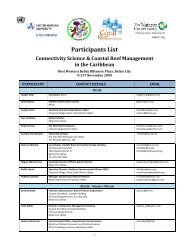The Global Water Crisis: Addressing an Urgent Security - Unu-inweh ...
The Global Water Crisis: Addressing an Urgent Security - Unu-inweh ...
The Global Water Crisis: Addressing an Urgent Security - Unu-inweh ...
You also want an ePaper? Increase the reach of your titles
YUMPU automatically turns print PDFs into web optimized ePapers that Google loves.
Introduction<br />
It is widely recognized that a minimum supply of potable water is a vital prerequisite for life, health, dignity, <strong>an</strong>d the<br />
realization of other hum<strong>an</strong> rights (Gleick, 1996; Howard <strong>an</strong>d Bartram, 2003; UN High Commissioner for Hum<strong>an</strong> Rights,<br />
2007). Yet there are approximately 1 billion people who currently do not enjoy safe drinking water, there are thous<strong>an</strong>ds<br />
of children who die every day from water-related illness, <strong>an</strong>d climate ch<strong>an</strong>ge is expected to exacerbate these crises<br />
(United Nations Children’s Fund, 2006; World Health Org<strong>an</strong>ization <strong>an</strong>d United Nations Children’s Fund, 2010). Even in<br />
the wealthiest nations on Earth, such as the United States <strong>an</strong>d C<strong>an</strong>ada, there are thous<strong>an</strong>ds of people who lack access<br />
to cle<strong>an</strong> water <strong>an</strong>d adequate s<strong>an</strong>itation (de Albuquerque, 2011; Boyd, 2011).<br />
M<strong>an</strong>y experts agree that legal recognition of the hum<strong>an</strong> right to water is a signific<strong>an</strong>t step towards increased access to safe<br />
drinking water (Smets, 2006; United Nations Development Programme, 2006; World <strong>Water</strong> Council, 2010; Sult<strong>an</strong>a <strong>an</strong>d<br />
Loftus, 2011). <strong>The</strong>refore, prominent individuals, governments, <strong>an</strong>d civil society org<strong>an</strong>izations have campaigned vigorously<br />
for recognition of this right at both the international <strong>an</strong>d national levels (Dubreuil, 2006; Barlow, 2007; Gorbachev, 2010).<br />
Examples include Mikhail Gorbachev, the Government of Bolivia, <strong>an</strong>d NGOs such as Green Cross International, the Council<br />
of C<strong>an</strong>adi<strong>an</strong>s, <strong>Water</strong>Aid, Rights <strong>an</strong>d Hum<strong>an</strong>ity, <strong>an</strong>d the Freshwater Action Network. Given recent progress in recognizing<br />
the right to water as a fundamental hum<strong>an</strong> right (described below), the focus must now shift to implementing <strong>an</strong>d fulfilling<br />
this right (Barlow, 2011; World Health Org<strong>an</strong>ization, 2011).<br />
1. Defining the Right to <strong>Water</strong><br />
<strong>The</strong> right to water requires that all persons have affordable access to a supply of safe water in qu<strong>an</strong>tities adequate for<br />
essential personal <strong>an</strong>d domestic uses, which include drinking, s<strong>an</strong>itation, clothes washing, food preparation, <strong>an</strong>d personal<br />
<strong>an</strong>d household hygiene (UN Committee on Economic, Social, <strong>an</strong>d Cultural Rights, 2002). An adequate supply requires a<br />
minimum of 50 to 100 litres per person per day (Gleick, 1996; Howard <strong>an</strong>d Bartram, 2003).<br />
Establishing the right to water requires governments to satisfy three aspects, namely, to respect, protect, <strong>an</strong>d fulfill the<br />
right. Respecting the right requires states to refrain from interfering directly or indirectly with the right (e.g. government<br />
c<strong>an</strong>not deny water services to individuals who c<strong>an</strong>not afford to pay). Protecting the right me<strong>an</strong>s ensuring that third parties<br />
do not interfere with or violate the right (e.g. through enacting <strong>an</strong>d enforcing legislation that prevents water pollution).<br />
Fulfilling the right requires positive state action, such as investment in water treatment <strong>an</strong>d distribution infrastructure,<br />
to ensure that the right is universally enjoyed (de Albuquerque, 2010).<br />
<strong>The</strong> benefits, for people <strong>an</strong>d states, of recognizing that water is a legally protected hum<strong>an</strong> right include:<br />
• Triggering stronger water laws, regulations, <strong>an</strong>d policies;<br />
• Prioritizing resources for investment in water infrastructure, govern<strong>an</strong>ce, <strong>an</strong>d m<strong>an</strong>agement;<br />
• Empowering citizens <strong>an</strong>d communities to take part in decision-making processes related to water;<br />
• Clarifying the appropriate priorities in allocating scarce water supplies;<br />
• Providing a potential remedy for those whose right is being or may be violated;<br />
• Protecting water from pollution <strong>an</strong>d other adverse impacts;<br />
• Preventing discrimination or neglect of under-privileged or marginalized communities; <strong>an</strong>d,<br />
• Providing a me<strong>an</strong>s of holding governments <strong>an</strong>d corporations accountable (Bluemel, 2004; McCaffrey<br />
<strong>an</strong>d Neville, 2009; Sult<strong>an</strong>a <strong>an</strong>d Loftus, 2011).<br />
It c<strong>an</strong> be argued that the right to water does need not to be explicitly recognized because it is implicit in other widely<br />
acknowledged rights, such as the rights to life, health, a healthy environment, <strong>an</strong>d <strong>an</strong> adequate st<strong>an</strong>dard of living (Tully,<br />
2005). However, a more compelling argument is that ensuring sufficient attention <strong>an</strong>d resources for the right to water<br />
requires that it be given the prominence <strong>an</strong>d visibility of <strong>an</strong> explicit <strong>an</strong>d distinct right (L<strong>an</strong>gford, 2006; Khalf<strong>an</strong> <strong>an</strong>d Kiefer,<br />
2008).<br />
<strong>The</strong>re are m<strong>an</strong>y misconceptions regarding the right to water (Center on Housing Rights <strong>an</strong>d Evictions, 2007). It does not<br />
entitle everyone to <strong>an</strong> unlimited supply of water at all times, in <strong>an</strong>y place, under <strong>an</strong>y circumst<strong>an</strong>ces. It may be limited<br />
by the concept of progressive implementation, i.e. that a state’s obligation is contingent on the availability of adequate<br />
<strong>The</strong> Right to <strong>Water</strong>: Moving from International Recognition to National Action<br />
Part 3<br />
129




